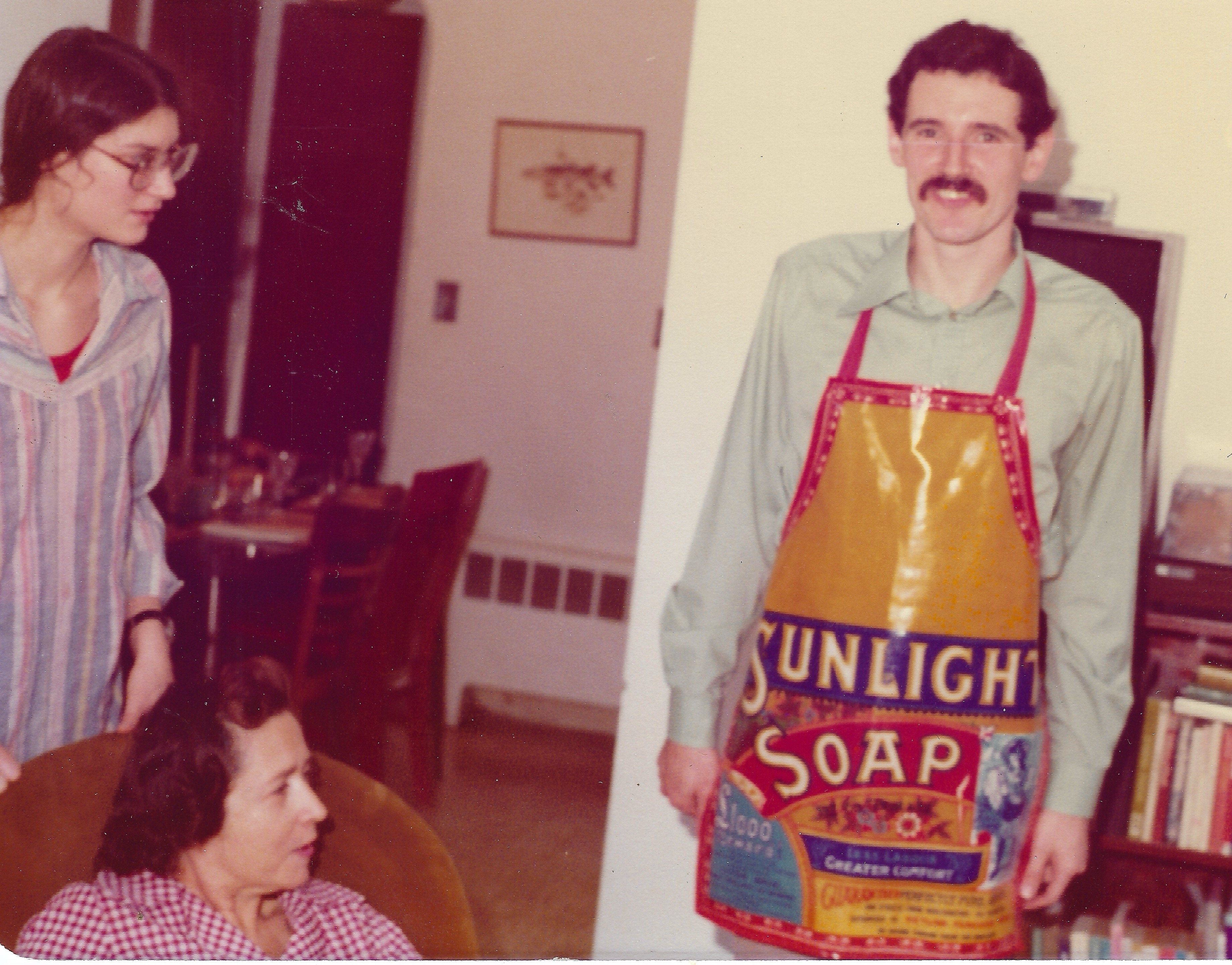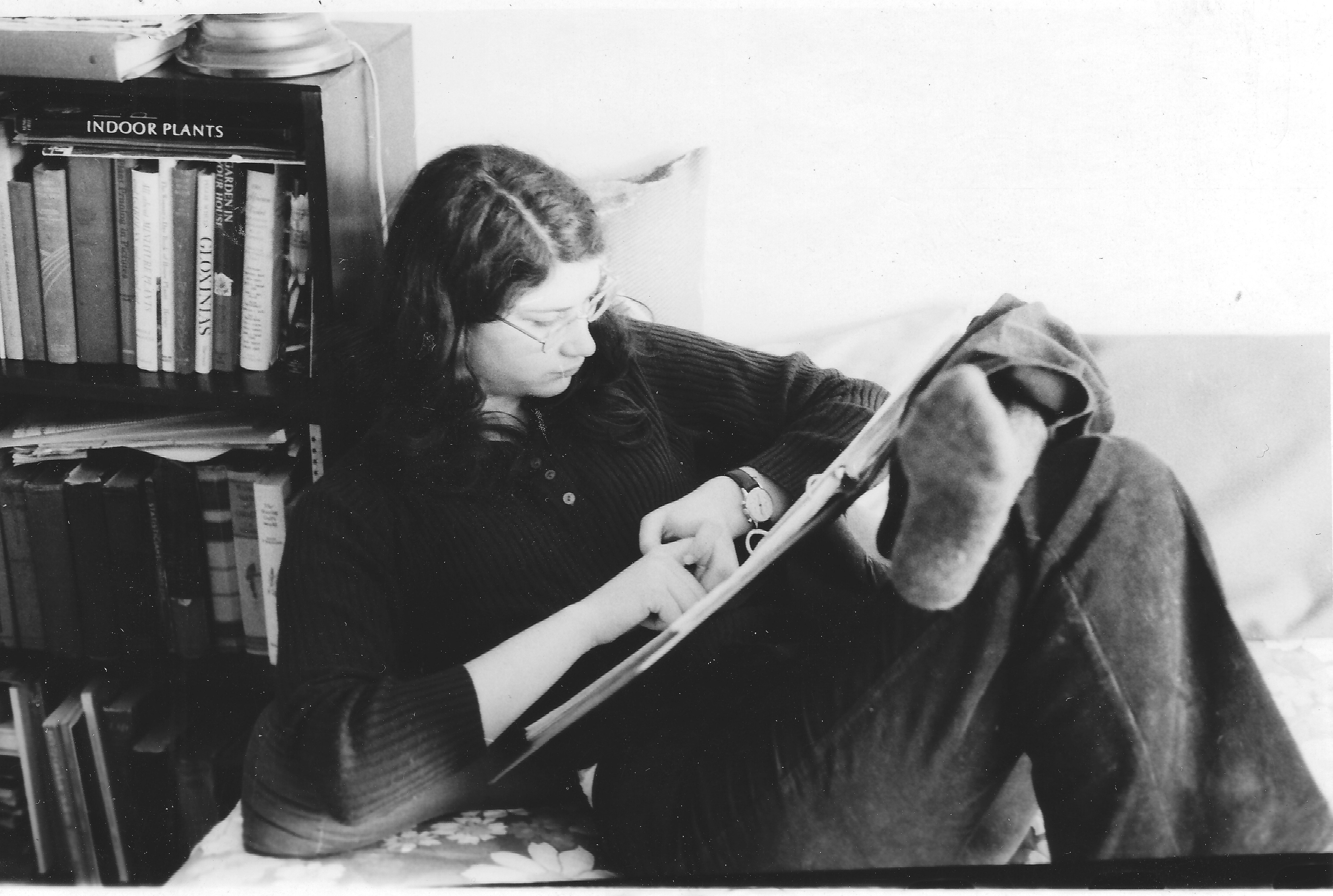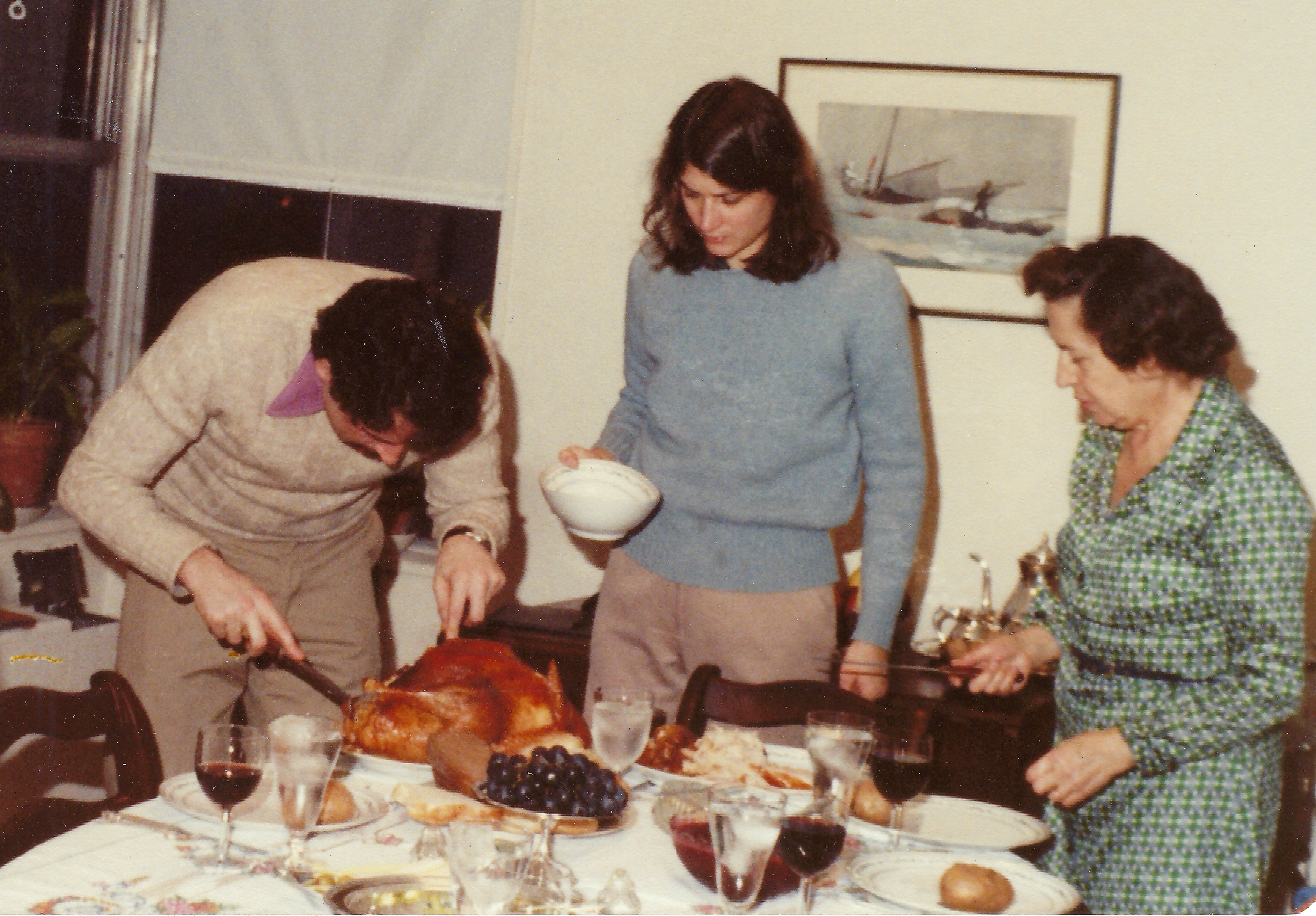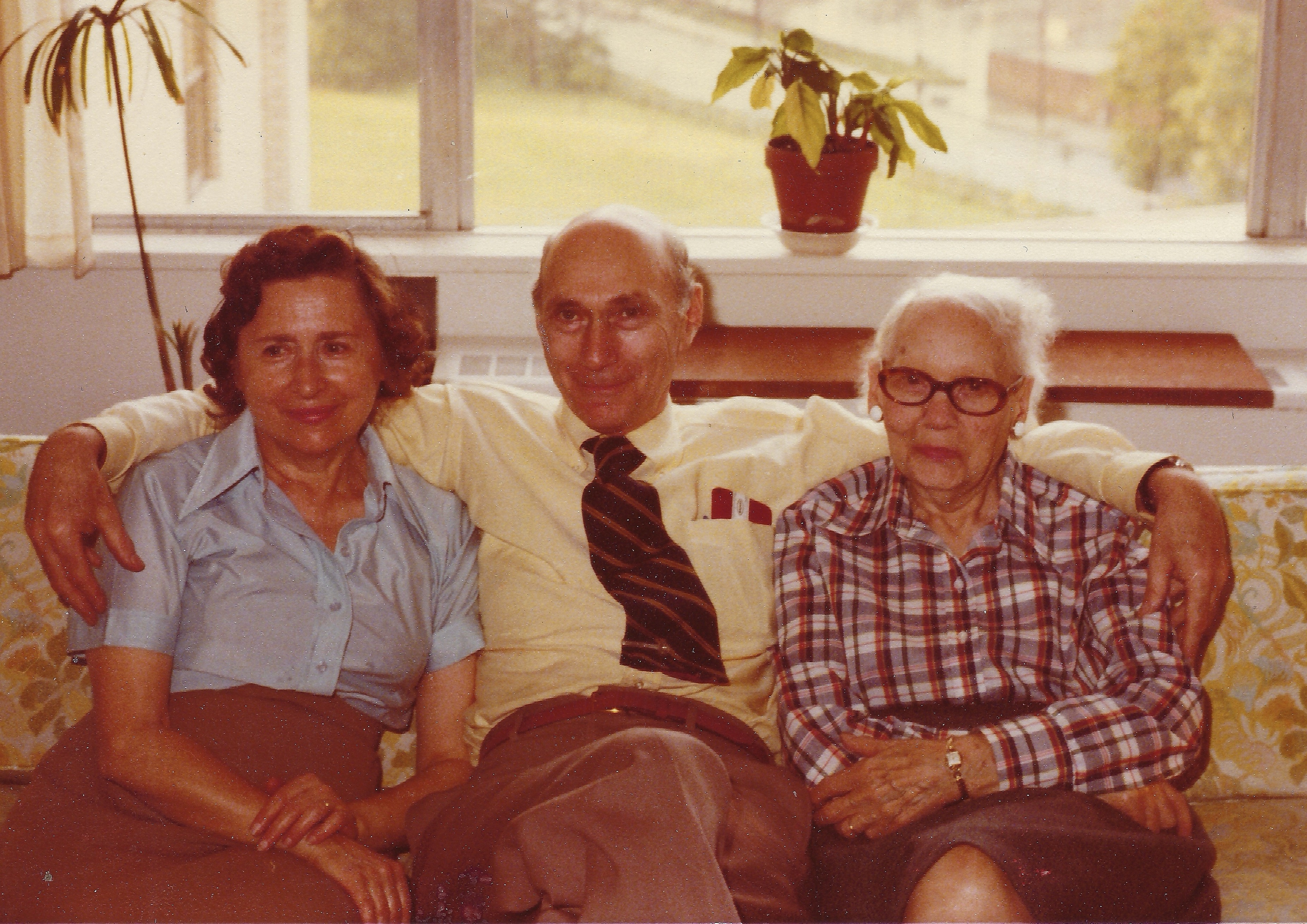 Dr. McKenna cooking dinner for Dr. Muschel and his in-laws in the Bronx
Dr. McKenna cooking dinner for Dr. Muschel and his in-laws in the Bronx
It was 1972, and Ruth Muschel and Gillies McKenna were in adjacent labs pursuing cell biology Ph.D.s in Einstein’s Medical Scientist Training Program (MSTP). Friends introduced them, it was a match, and in 1974 they married. In 1978, she graduated, presenting their first logistical challenge: He had three years to go. She agreed to train in anatomic pathology at nearby Columbia University while he finished up.
Ruth Muschel, M.D./Ph.D. ’78, and Gillies McKenna, M.D./Ph.D. ’81, then headed to Maryland—she to the National Cancer Institute in Bethesda to complete her residency, he to intern at Johns Hopkins in Baltimore.
A Professional Synergy
Dr. McKenna next joined Dr. Muschel at the NCI, where he completed a residency in radiation oncology and she worked on staff. “We shared a tiny space,” he says. “But that was good in one sense, because our interests began to overlap. I started using the novel cell lines Ruth was creating for my experiments. And she became interested in the radiation biology I was exploring.” Together they moved on to academic positions at the University of Pennsylvania. The first of more than six dozen papers on which they both appeared as authors was published in Science in 1988.
Their last professional home was the University of Oxford, where Dr. McKenna became professor of radiation oncology and biology, and director of the Oxford Cancer Center. Dr. Muschel became a professor of molecular pathology in the department of oncology, and deputy director of the Oxford Institute of Radiation Oncology. Today they live comfortably in Berkeley, California.
 Gillies McKenna at his graduation in 1981
Gillies McKenna at his graduation in 1981
Elements of a Successful Partnership
Collaboration is a stated value of Albert Einstein College of Medicine. How did the relationship of these two physician scientists survive 50-plus years of personal and professional metamorphosis?
Listening. “When you’re talking about having a partnership work, you have to be open to having your theories and ideas questioned,” says Dr. Muschel. “You can’t be too dogmatic.”
Commitment. “We were determined not to be separated,” says Dr. McKenna. “Once you separate, it’s hard to keep a relationship going.”
Taking turns. After graduating from Einstein, Dr. Muschel had wanted to leave New York but stayed while Dr. McKenna finished medical school. They agreed that when he graduated, she could choose their next location.
Compromise. Says Dr. McKenna, “Penn for example wasn’t the first choice for either of us, but it was best for both of us.”
Respecting separate interests. “Ruth’s research on metastasis was never really a major interest of mine, nor was my clinical work in radiation oncology of much interest to her,” says Dr. McKenna.
Fruits of Their Labor
Both physician-scientists—he more the physician, she more the scientist—look back with satisfaction upon their careers. “I’m proud of the people I trained,” says Dr. Muschel. Likewise Dr. McKenna: “I built a strong department at Penn.” Subsequently, he and Dr. Muschel established a research institute at Oxford and trained many people who attained greater heights.
 Dr. Muschel studying at Einstein
Dr. Muschel studying at Einstein
A major direction of Dr. Muschel’s research was defining the tumor microenvironment in colorectal cancer liver metastasis, including infiltration by neutrophils and macrophages, and specific modifications of the extracellular matrix. Targeting these features led to successful treatment in mice. Some of Dr. McKenna’s work grew from her finding that tumor cells transformed by oncogenes were not only tumorigenic but metastatic. “I wondered, do oncogenes affect other properties of tumor cells?” he says. “Do they affect sensitivity to radiation, for example? And it turned out they did.” That led to a series of publications on the molecular basis for differences in radiation sensitivity in tumor cells and in tumor metabolism.
Both MSTP graduates have received national and international recognition for their accomplishments. In 2022, Dr. Muschel received the Distinguished Ph.D. Alumnus award when she returned to campus and gave a talk reflecting on her career to fellow alums, faculty, and students on campus.
 Thanksgiving with Drs. Muschel and McKenna
Thanksgiving with Drs. Muschel and McKenna
Paying It Forward
Drs. Muschel and McKenna are honest about it: They were attracted to Einstein’s MSTP because it funded both the M.D. and Ph.D. degrees. Still, says Dr. Muschel, “we were living in poverty.” “Ruth’s parents paid the rent on our apartment, and on Fridays, we’d go over and have dinner with them,” adds Dr. McKenna. “We’d leave with groceries for the rest of the week. Their generosity got us through.”
MSTP students still pay no tuition but still have other costs, such as living expenses and educational materials. To ease their financial burden, Drs. Muschel and McKenna have established the Anne Orzel Muschel and Louis H. Muschel Endowed Student Support Fund, in honor of her parents. Freeing students from debt will change lives and allow them to enter academia, where salaries are lower than in private practice or industry. “I’d like to see students pursue their intellectual interests, not their financial interests,” says Dr. Muschel. Adds Dr. McKenna, “Hopefully, the support will result in a new generation of altruistic academic leaders coming from Einstein.”
 Dr. Muschel’s mother, father and grandmother, Betty Tubachnik Muschel
Dr. Muschel’s mother, father and grandmother, Betty Tubachnik Muschel
The MSTP marked its 60th anniversary in 2024, making it one of the longest-standing physician-scientist training programs in the country, notes Dr. George Y. and Catherine H. Wu MSTP Director Myles Akabas, M.D., Ph.D. Drs. Muschel and McKenna were not able to attend the festivities celebrating the program’s milestone anniversary but, says Dr. Akabas, “we could not be more pleased to receive their timely contribution to the life and longevity of Einstein’s MSTP as it transforms today’s outstanding students into tomorrow’s physician-scientist leaders.”